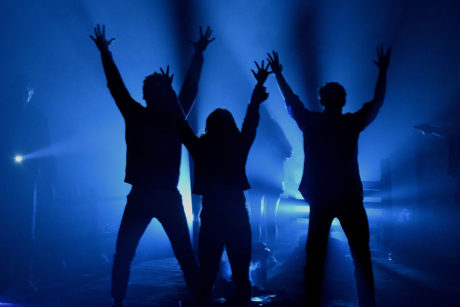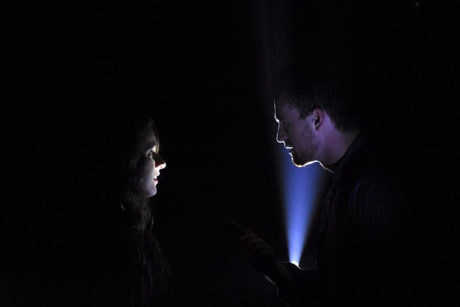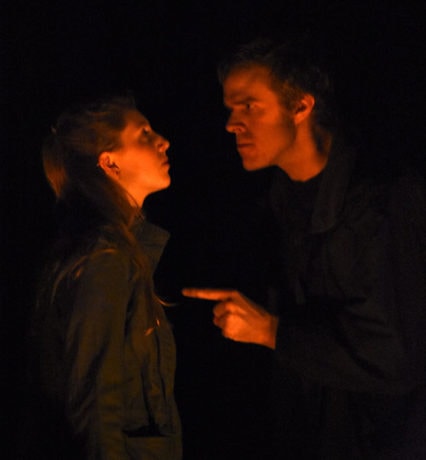When you enter the home of the Princeton Summer Theater to see The Crucible, you may wonder at first whether you’ve wandered into the right place. After all, Arthur Miller’s legendary play takes place during the Salem Witch Trials of the 1690s. But the stage is nearly bare: spotlights and their supporting trusses are virtually the only things on the stage, and the back wall of the stage house is exposed.

This is The Crucible, all right – but director Nico Krell’s idiosyncratic take on the classic drama is sure to raise eyebrows.
Miller’s 1953 play may be set centuries ago, but Miller intended it as an allegory for something that was of vital importance at the time: the Red Scare of the early 1950s, when Senator Joseph McCarthy accused people of being Communists with little or no evidence. (Miller and many of his artistic associates were targeted by the notorious House Committee on Un-American Activities.) Miller’s play depicts characters – many of them real-life figures – caught up in the turmoil of the Witch Trials, and the story follows a group of young girls who accuse others of being in league with the Devil. Miller focuses on one of the accused, John Proctor, and how his world collapses when he’s accused of witchcraft.
It’s a gripping tale, and the twists and turns in the story have not faded with time. Krell gets strong performances out of his young ensemble, led by Christopher Damen’s resolute, focused performance as John Proctor. Damen does an excellent job of portraying the excruciating torment John goes through as he struggles to do the right thing for his family and his community. Alexandra Holden is wonderfully indelicate as Abigail Williams, the temptress who accuses John of witchcraft as revenge for spurning her affections. Abby Melick brings a fragile nobility to the role of John’s wife Elizabeth, and Meagan Raker is headstrong as Mary Warren, the servant who ends up playing an important role in John’s trial. Ben Diamond is disquieting in his even-toned the Reverend Hale, who starts as John’s chief accuser but ends up changing his stance on the trials. Peter Giovani brings chilling notes to the accusatory Reverend Parris, and Bobby Keown is fearsome as the chief judge.
Those seven actors make up the entire cast of this version of The Crucible – even though Miller wrote the play with more than twice as many characters. That means that all the actors (except Damen) must play multiple roles. But the changes don’t end there. This is a radical Crucible – one that deconstructs the play, sometimes in troubling ways.

The production opens with spacey, ambient synthesizer music and flashing lights – and as the actors enter, they all wear contemporary clothing including khakis, a sweater, a windbreaker, shorts, and a backwards baseball cap. (Joseph Haggerty is the Set Designer and Sound Designer, Alex Mannix is the Lighting Designer, and Julia Peiperl is the Costume Designer.) The actors, all of whom appear to be in their early twenties, exchange high-fives and take selfies, then build a bonfire and place folding canvas chairs around it. After a few minutes of this, Holden takes out a paperback edition of The Crucible and begins reading it aloud from the beginning, including stage directions and descriptions of the characters. The other actors smirk at first, but eventually they seem to catch on to what she is doing, taking the book from her and reading the descriptions as well. Soon some of the people onstage begin acting out the parts in the play without the book. Eventually everyone is off-book, though some of them return to the book in Act Four. (The conceit of the actors depending on Miller’s book for their words is handled inconsistently, and trying to figure out when they’re reading and when they’re “acting” takes up a lot of time that could be spent trying to focus on the plot.)
Some of Krell’s artistic choices work well. The best comes in a scene where John Proctor, under the relentless questioning of the Reverend Hale, is asked to recite the Ten Commandments and struggles to remember them all. As Damen slowly works his way through the Commandments, the rest of the cast chants the numbers in unison. This adds tension and makes Proctor’s struggle even more palpable.
But most of Krell’s choices muddle the story. Having the actors leap between characters in the middle of a scene makes the story harder to follow. A big chunk of the Act Three courtroom scene consists of Keown playing a scene as both a terrifying judge and a frightened witness, with the actor turning his head back and forth to play both characters. All of that gets in the way of the story. And Krell’s augmentations and slow pace add about 15 minutes to an already-lengthy play.
Mannix’s lighting gets in the way too. Each act has a different lighting concept. For instance, Act One is largely lit by spotlights from the side, Act Two by flames and footlights. But Act Three takes the idea to extremes: the entire act, lasting well over half an hour, is performed in darkness pierced only by hand-held pinpoint flashlights. I found this physically painful to watch, and had to cover my eyes for long stretches.
Princeton Summer Theater’s audacious take on The Crucible is always fascinating. It’s filled with solid performances, and some of Krell’s touches are inspired. But Miller set his play in the past for a reason, and updating it gets in the way of Miller’s message. And while adding a modern perspective to The Crucible may be a good idea, Princeton Summer Theater’s version proves to be way, way, way too much of a good thing.
Running Time: Three hours, with an intermission.

The Crucible plays through August 6, 2017 at Princeton Summer Theater, performing at Hamilton Murray Theater on the campus of Princeton University in Princeton, NJ. For tickets, call (732) 997-0205, or purchase them online.




